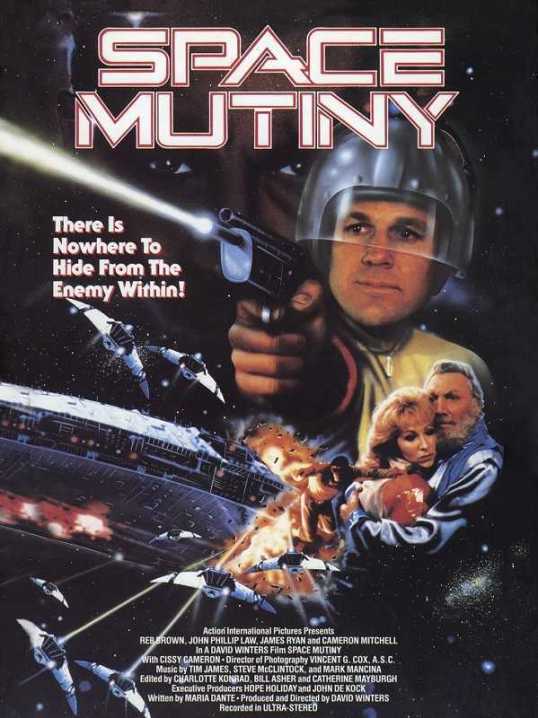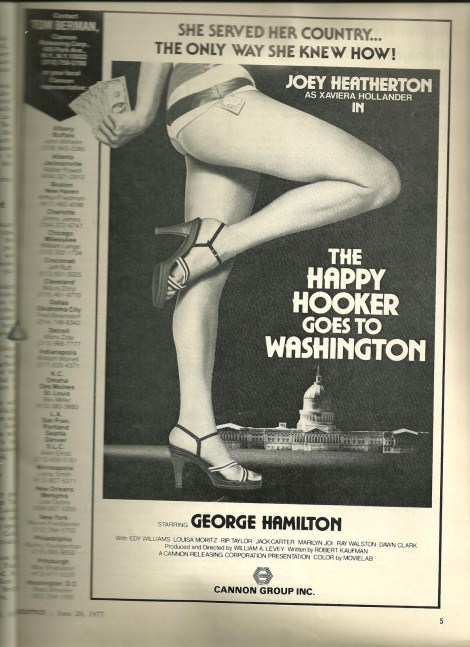“Arggggh!”
— Dave Ryder (Reb Brown) in Space Mutinty (1988)
Space Mutiny, a sci-fi epic from 1988, is full of dialogue about all sorts of political and philosophical concerns but none of it is quite as memorable as the quote above. Dave Ryder says, “Argggggh!” a lot over the course of Space Mutiny. He’s the newly appointed head of security for the Southern Sun, a gigantic spaceship that has spent the last 260 years traveling from Earth to a new planet. Being head of security is important because there are some people on the Southern Sun who are plotting a mutiny. Dave Ryder decides that the most effective way to battle the mutineers is to yell loudly and frequetly. “ARGGGGGH!’ Ryder yells whenever he’s being shot at. “ARGGGGGGGH!” he screams when he finds himself on a very slow and gradual collision course with the head of the mutineers.
When Dave isn’t saying stuff like, “Argggggh!,” he’s saying stuff like, “Go! Go! Go!” When the bad guys open fire on him and his men, it’s time for them to “Go! Go! Go!” When the mutineers are being chased, Dave is quick to tell everyone to “Go! Go! Go!” He’s like the physical fitness trainer from Hell. He never actually yells “Feel the burn!” but you can be damn well sure that he’s thinking it. In fact, there’s a point in the movie where “Feel the burn!” actually would have been a good line. Dave and his girlfriend, Lea (Cissie Cameron), set a mutineer on fire. It’s actually a bit of a sadistic scene and it doesn’t come across as being the big hero moment that it’s obviously meant to be. But, then again, Dave isn’t yelling because he’s a nice guy. He’s yelling because he’s played by Reb Brown. Reb Brown yelled all the way through Strike Force Commando. Why wouldn’t he do the same for Space Mutiny?
Of course, Dave isn’t the only person barking out orders on the Southern Sun. Cameron Mitchell plays the ship’s captain, a wise old man who looks like Santa Claus. John Phillip Law is Kalgon, the main mutineer. He laughs a lot. Cissie Cameron is the captain’s daughter. She falls for Ryder, despite the fact that she appears to be old enough to be Ryder’s mother. (In real life, Reb Brown and Cissie Cameron are married and Cissie is only a few years older than Reb. In Space Mutiny, she’s stuck with an unflattering hair style and is made up to look like an aging cheerleading coach.) There’s also a woman who works on the ship’s bridge. She’s killed in one scene, just to mysteriously turn up alive in the scene that follows. In space, no one can hear the script supervisor. Finally, there’s a group of alien witches who board the ship and spend the entire movie dancing in front of a ball of electricity. Since they don’t actually interact with any of the main characters, it’s obvious that they were added to pad out the film’s running time.
One of the more interesting things about Space Mutnity is that Kalgon actually has a point. It does seem kind of stupid to spend several hundred years traveling to just one planet when there’s other planets nearby that the ship could just as easily reach. Indeed, the mission of the Southern Sun never makes that much sense and the Captain seems to be delusional in his insistence that it does. The Captain’s unending faith and his long-flowing beard makes him come across like a minor biblical prophet, the type who always had to ask a major prophet to interpret his visions for hm. The Captain does not come across like someone who really knows what he’s doing. I don’t care how much Ryder screams, Kalgon had a point!
Today, Space Mutiny is best known for being featured on an episode of Mystery Science Theater 3000 and for later being taken apart by the Rifftrax crew. Space Mutiny, though, is such an extremely silly movie that you really don’t even need any professionals to help you snark your way through it. The film offers up such a treasure trove of material then even the most humorless among your friends will be a comedic genius by the time it ends. It’s a fun movie, made even more so by the fact that the filmmakers apparently meant for the film to be taken seriously. There’s a lot of talk about important issues like freedom, duty, and faith. In the end, what you’ll remember is the screaming.


